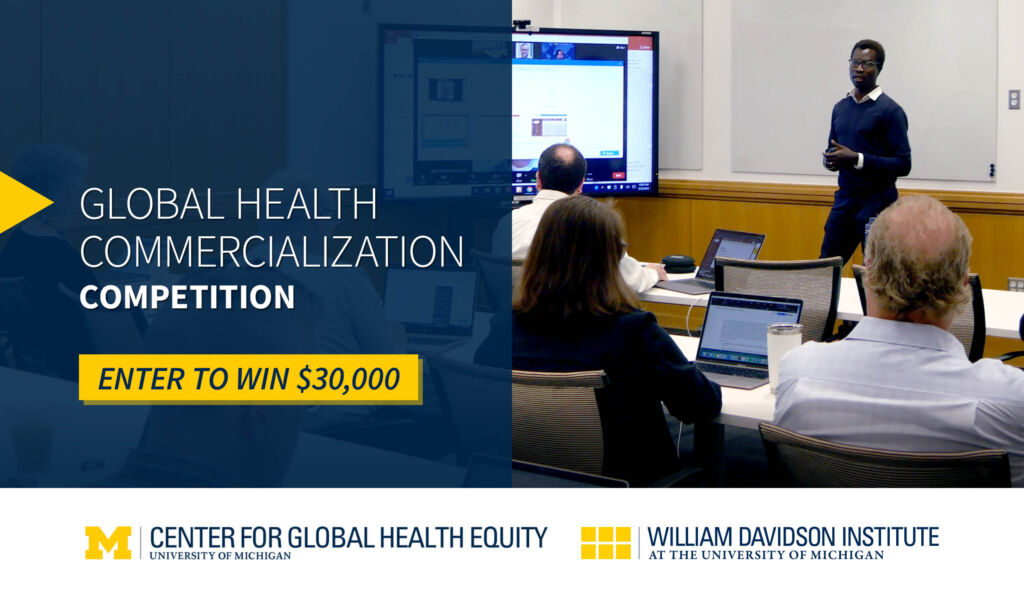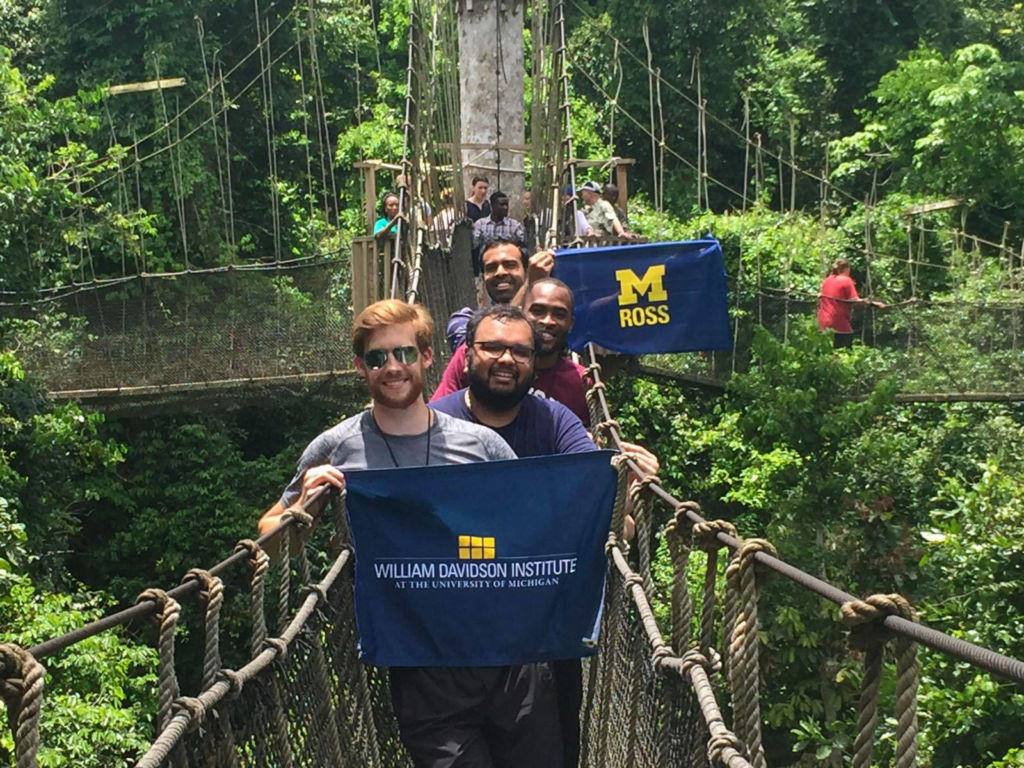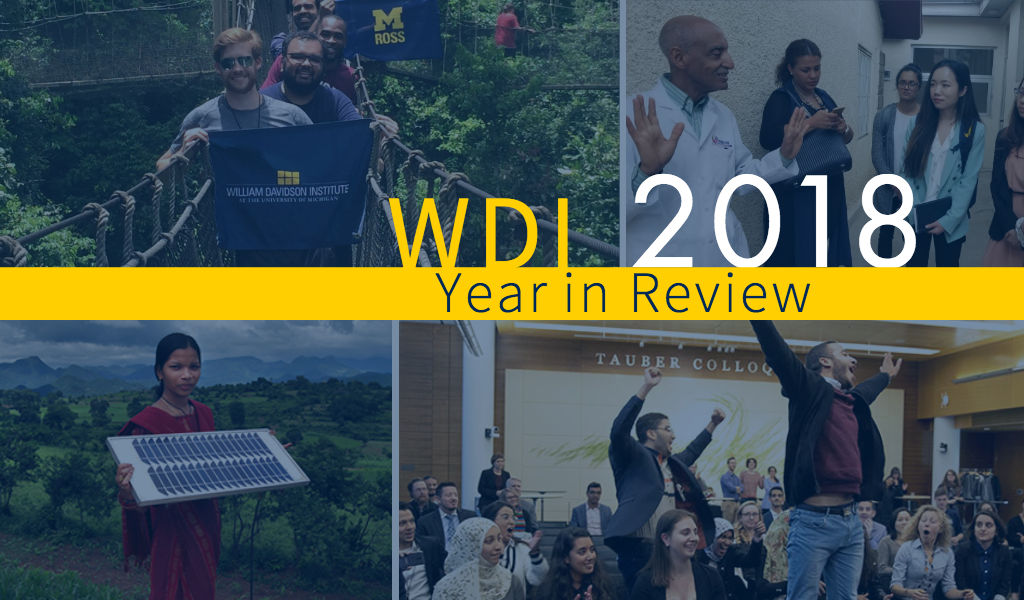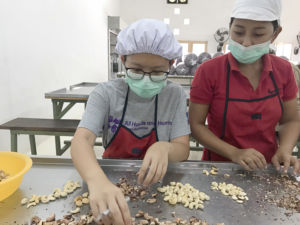
The William Davidson Institute at the University of Michigan is excited to announce the call for applications for the 2024 Global Health Commercialization Competition. This innovative competition serves as a dynamic platform for U-M faculty visionaries based on the Ann Arbor, Flint, and Dearborn campuses, who wish to contribute their scientific and technological solutions to the most pressing global health challenges of our time.
Co-hosted by the U-M Center for Global Health Equity (CGHE) and the William Davidson Institute (WDI), the competition showcases U-M’s commitment to global health equity, with a unique market-driven approach. The competition relies on interdisciplinary collaboration to create sustainable and impactful innovations, aiming to improve healthcare in low- and middle-income countries around the world.
Competition participants will present their business case within a 15-minute timeframe to a panel of industry experts, followed by an informative 10-minute Q&A session. The winning team will be awarded substantial funding of $30,000, provided jointly by the CGHE and the WDI. Additionally, the winning team will be eligible for further consultative services provided by MBA students from our Ross School of Business, as a part of the Multidisciplinary Action Projects (MAP) Program.
The competition also provides extensive proposal review, guidance, and mentorship to all its participants, increasing their likelihood of success. Each shortlisted team is also entitled to a one-on-one consultation session with a member of the Fast Forward Medical Innovation (FFMI) team, who will review the project and provide constructive recommendations to enhance its prospects.
Proposals are due by April 5, 2024, providing an opportunity for team participants to fine-tune their pitches and maximize their chances of success. Application forms, template presentations, and more information about the event is available on our website.
Read more about last year’s competition
Most studies regarding Health Information Systems (HIS) in low and middle-income countries have focused on their adoption and use based on survey data but there has been limited work on network effects and evolution of natural standards in the HIS industry. However, network externalities will play an important role in determining the socially optimal solution and much can be learned from other industries with strong network effects. Based on a review of other industries with strong network effects, this paper argues: a) there little evidence to suggest that the market will arrive at an inferior solution even when network effects are strong, b) standardization that results from network effects is beneficially limited to those components that have the strong network effects, c) when the source of the network externality itself benefits from innovation, the market will gravitate toward a single firm controlling the standard; however, when the standard is not subject to innovation, the market will gravitate toward a single standard that is not controlled by a single firm in order to benefit from competition. This paper highlights the potential risks of global agencies/donors swaying the market for HIS towards standardization, which could lead to an inferior HIS solution.
Redat Healthcare is an Ethiopia based ambulance, house call, home care and telehealth service provider that will utilize a GPS based application to connect medical professionals and ambulances with patients for house call clinical services. Ethan Healthcare is developing an application that will connect patients with medical professionals. This project involved developing a funding model that would tap into the diaspora by generating funding that would cover the cost of services for friends and family back in Ethiopia.
WDI collaborated with Aceso Global on a project for the Global Fund to Fight AIDS, Tuberculosis and Malaria to examine how the organization might engage more with the for-profit private health sector in multiple low- and middle-income countries (LMICs) to help achieve its objective of eradicating the three diseases and inform the development of its next five-year strategy.
WDI and Aceso Global conceptualized and carried out a landscaping study of multiple aspects of the for-profit private health sector in LMICs, including health service delivery, supply chain, how care is paid for, and digital health. The team analyzed challenges and barriers to engage with the for-profit private health sector. Recommendations based on the research were presented in a final report on how to expand the Global Fund’s engagement with the for-profit private health sector. Additionally, six case studies were developed to give the Global Fund deeper insights in selected countries, of which WDI developed case studies on South Africa and Kenya.
This primer provides a comprehensive but non-technical overview of the distinct health information systems (HIS) that all together support health care delivery in low-resource settings. It opens with a historical account and landscape assessment and describes the urgent need to build a lean rigorous HIS that integrates these different components. Subsequent sections describe the individual systems that: i) track individual patient and health care provider information; ii) directly document care delivery; iii) provide public and population health data; iv) support facilities’ and community health workers’ administrative and financial functions; and v) coordinate logistics and health commodities supply chains. A separate section describes imported data, including “master data” and manufactured (e.g., “meta”) data. The primer closes with recommendations for principled HIS stewardship.
WDI’s Healthcare Initiative has collaborated since early 2018 with physicians in Michigan Medicine’s NIH-funded Ghana Emergency Medicine Collaborative (GEMC) to improve emergency department (ED) operations, finances and clinical delivery. The sites include 1,200-bed Komfo Anokye Teaching Hospital (KATH) and 2,200-bed Korle Bu Teaching Hospital (KBTH) in Kumasi and Accra, respectively. MBA MAP teams have worked in each hospital in March-April 2018 (at KATH) and 2019 (at KBTH), with much recent work focusing on measuring the debilitating consequences of paper billing and payments (called “cash & carry”) that are presently made by patients exclusively in hard currency.
WDI has introduced simple tools at each hospital to track patient flows (e.g., a daily ED census), measure payments-related delays, seek to establish sustainable business processes and identify root causes of operational dysfunction. WDI has also recommended specific, step-wise actions at both hospitals that begin with offering patients a simple mobile payments option and thereafter proceed to digitize and restructure the entire revenue cycle (i.e., the process of generating a bill and collecting payment) and all of the surrounding clinical workflow. WDI is working with development officers from Michigan Medicine’s Emergency Medicine Department and GEMC to line up funding for further work. Several publications are being readied for submission to peer-reviewed journals (e.g., using census collected at KATH and KBTH) and two white papers are also near completion.
E-Heza is a digital health record developed in Rwanda. The newest modules have been completed and the team has expanded the existing modules to 14 new health centers. TIP is in the process of working on strategy, scale and operations’ needs. This project involved developing criteria for partnerships for market expansion through an analysis of the geographic, political, cultural, and healthcare landscapes in East Africa.

A 2018 WDI MAP team in Ghana.
Carrie Boyle, a MBA student at Michigan’s Ross School of Business, hopes to work in philanthropy somewhere in the U.S. after graduation. But for a couple of weeks in March, she is excited to be traveling to India as part of the school’s annual Multidisciplinary Action Projects (MAP).
“Working in another country is something I may never get the chance to do again,” she said. “This will be my first time in India and the country really interests me.”
Boyle and her teammates will work with Michigan Academy for the Development of Entrepreneurs (MADE), a nonprofit institute established at Ross by the Zell Lurie Institute for Entrepreneurial Studies, in partnership with WDI and Aparajitha Foundations. MADE works with entrepreneurship development organizations in India to help entrepreneurs operating small- and medium-sized enterprises (SMEs) succeed.
Boyle said she had some criteria when looking for MAPs that interested her.
“I wanted an opportunity to be on the ground having meaningful conversations with the people most immediately impacted by SMEs,” she said. “SMEs employ so many people and impact so many lives.”
Her teammate Shoko Wadano said she too is interested in working with SMEs, “which are very common in India.”
“I’m interested in how businesses mature in India,” she said. “I want to learn what pressures and impacts SMEs have in common, and what kind of value we can bring to them.”
WDI is sponsoring the MADE MAP project along with 10 others this year. MAP is an action-based learning course in which MBA students receive guidance from faculty advisors from WDI and Ross. Each project requires analytical rigor, critical thinking and teamwork. (Find out more about WDI’s MAP projects over the years here.)
After learning about their projects and conducting secondary research for several weeks, the student teams spend two to four weeks working with their organizations in the field.

David Butz
“The complementarities between the talents our students bring and what our sponsors need are sublime,” said David Butz, a WDI senior research fellow in the Healthcare sector who is an advisor on two projects. “Our students experience impact in brand new ways. Our sponsors learn, too, how disciplined management methods can yield dramatic innovations.”
Butz said he enjoys working with the student teams on MAP because it “poses such a unique challenge for both the students and their sponsor organizations, and forces us all to think big.”
“For me, the best achievements are tangible, direct and narrow but at the same time big and high-impact,” he said. “In our short time, can we help to break some key bottleneck, expedite a critical process pathway or otherwise liberate resources and expand capacity? Is the innovation scalable or replicable elsewhere? Do the students and organizations thereby feel empowered?”
Here is a summary of each WDI-sponsored MAP project:
Aravind Eye Care System – India
MAP Team: Rohan Dash, Sid Mahajan, Aman Rangan, Nik Royce
Aravind Eye Care System (AECS) is a vast network of hospitals, clinics, community outreach efforts, factories, and research and training institutes in south India that has treated more than 32 million patients and has performed 4 million surgeries since its 1976 founding.
AECS opened a tertiary eye care center in Chennai in September 2017 that will ultimately serve more patients than any other facility in the AECS system. The MAP team will formulate a detailed three-year strategic plan for Aravind Eye Hospital in Chennai.
CURE International, Inc. – Kenya, Ethiopia, Zambia, Uganda
MAP Team: Dominique James, Sarah Raney, Hannah Viertel, Olga Vilner Gor
CURE operates clubfoot clinics in 17 countries around the world, each tasked with helping children and families deal with the congenital deformity that twists the foot, making it difficult or impossible to walk.
For CURE, the student team will develop a strategic evaluation framework to assess opportunities for market entry and expansion building on global data.
Ghana Emergency Medicine Collaborative – Ghana
MAP Team: Benjamin Desmond, Benjamin Quam, Nicholas Springmann, Vishnu Suresh
The Ghana Emergency Medicine Collaborative aims to improve emergency medical care in Ghana through innovative and sustainable training programs for physician, nursing and medical students. The goal of the training programs is to increase the number of qualified emergency health care workers retained over time in areas where they are most needed.
The MBA team will formulate a detailed strategy to implement interoperable digital payment systems in Ghanian hospital emergency departments.
India Investment Fund – India
The India Investment Fund is working to become the first international, student-run fund at the Ross School of Business. Ross MBA students would be responsible for investing, managing and growing a real investment portfolio.
MAP Team: Charlie Manzoni, Patrick Riley, Queenie Shan, Sheetal Singh
The student team will conduct due diligence on Indian small- and medium-sized enterprises to assess viability for investments, and an appropriate financing instrument.
Infra Group – Ethiopia
MAP Team: Rin Chou, Chandler Greene, Yuki Ito, Brittany Minor
Infra Group is diversified international group with business units in financial services, industries and infrastructure development. Infra Group helps build a more prosperous society through global-scale business development with integrity as its top priority.
The MAP team will conduct due diligence on a group of small- and medium-sized enterprises (SMEs), and recommend which ones to invest in and what amount to invest.
Lviv Business School & Ukranian Catholic University – Ukraine
MAP Team: Blake Cao, Emily Fletcher, Kelsey Pace, Adam Sitts
Lviv Business School and Ukranian Catholic University is a private educational and research institution in western Ukraine.
The student team will undertake a needs assessment of the small- and medium-sized enterprises (SMEs) to determine if Lviv Business School should begin offering consulting services to these SMEs and if so, how those should be structured.
MADE – Poornatha/Aparajitha Foundations – India
MAP Team: Carrie Boyle, Lawrence Chen, Dillon Cory, Shoko Wadano
Michigan Academy for the Development of Entrepreneurs (MADE) is a nonprofit institute established at the Ross School of Business by the Zell Lurie Institute for Entrepreneurial Studies, in partnership with WDI and Aparajitha Foundations. MADE works with entrepreneurship development organizations in developing countries to give individuals operating businesses in these environments the knowledge and best practices they need to thrive.
The MAP team will develop an expansion plan for MADE in the southern Indian state of Tamil Nadu.
The Ihangane Project – Rwanda
MAP Team: Lauren Baum, Nadia Kapper, Paul Mancheski, Jason Yu
The Ihangane Project (TIP) empowers local communities to develop sustainable, effective, and patient-centered health care delivery systems that holistically respond to the needs of vulnerable populations. Partnering with Ruli District Hospital and its associated health centers, TIP is working to identify key strategies for improving health outcomes.
The student team will develop a business model to grow the ready-to-use therapeutic food that is used to treat severe, acute malnutrition.
WEEKEND MBA MAP PROJECTS
Awash Bank – Ethiopia
MAP Team: Matthew Campbell, Joshua Dodson, Joseph McCarty, Aman Suri
Awash Bank, a private, commercial bank, was established in 1995 and features more than 375 branches across the country.
The MAP team will develop a product that can provide capital to small- and medium-sized enterprises (SMEs) in Ethiopia by utilizing remittances already being sent back to that country. The students will work with the bank on all aspects of the loan product. They also will give the bank recommendations on how to monitor the loan and provide business support to SMEs that borrow from the fund.
Grace Care Center – Sri Lanka
MAP Team: Daniel Cady, Yizhou Jiang, Gerardo Martinez, Daniel Murray
The Grace Care Center (GCC) is a home to about 70 orphaned children that offers daycare services and vocational training. It also is home to several poor and displaced seniors, many of whom have chronic health issues such as hypertension and diabetes.
Past MAP student teams from the Ross School of Business developed a diabetic care center model for GCC. This year’s student team will examine the current model and make any needed updates and revisions.
International Clinical Labs – Ethiopia
MAP Team: Emily Mascarenas, Torre Palermino, Alexander Santini, Matthew Traitses
ICL was established in 2004 to provide quality laboratory service all over Ethiopia. ICL serves more than 240 health care centers throughout the country, and is expanding its service throughout Ethiopia.
The Ethiopian government is building its first medical waste incinerator facility outside the capital city of Addis Ababa and has committed to building seven more around the country. WDI is assisting a group of business managers with business plan advice who are interested in managing the business aspects of operating the incinerators. The MAP team will develop a proposal to be presented to the government later this year for the business managers to operate the incinerators.

Improving reproductive health supply chains to boost access to family planning products in Mozambique. Educating senior managers from around the Baltics. Helping both investors and enterprises they support better measure impact in Latin America. Creating new MBA-level curriculum for universities in Papua New Guinea.
These partner projects are just a few examples of the work WDI performed around the world in 2018. Working with a robust set of private sector and nonprofit partners on a diverse number of projects, WDI effectively applied business skills in low- and middle-income countries (LMICs) in impactful ways.
In all, WDI teams worked on more than 40 projects with more than 40 partners in more than 40 countries this past year that focused on our core consulting sectors—education, energy, finance and healthcare, as well as our management education programs, entrepreneurship development, measurement and evaluation services and the deployment of University of Michigan graduate students around the world.
“In 2018, I was impressed by the degree to which the Institute integrated the energy and talents of our staff, University of Michigan students and faculty leaders to address multiple challenges facing for-profit and non-profit organizations,” said WDI President Paul Clyde. “While most of these projects were in one of our key focus areas—Energy, Healthcare, Management education or Finance—many drew on expertise that cut across sectors or disciplines to deliver more complete solutions.”
WDI’s project work leveraged the knowledge and expertise of the Institute’s staff, its research fellows and faculty from the University of Michigan and other world-class higher education institutions to develop business solutions in LMICs. Additionally, WDI disseminated what it learned doing work in the field through published research reports, academic journal articles and notable blog posts. The Institute also contributed to U-M student and faculty enrichment by hosting several compelling speakers at the Ann Arbor campus.

Members of the LIFE project consortium visit a produce stand in Turkey and interviews the owner on how a green grocer sources his produce and his perspective on how he could potentially benefit from the LIFE Food Enterprise Center.
Our work in 2018 spanned the globe and included projects on a wide variety of topics and issues. Among the work, WDI launched a new consulting focus area in the energy sector, connected hundreds of students using virtual technology, developed a model to train nurses for a planned hospital in Ethiopia and trained refugees in the food industry in Turkey. Here are a few highlights from our project work this past year.
Throughout the past year, WDI has widely shared its research and field work a to a broader audience through a number of publications and online journals.
“Participating in the project to test the framework provided us a holistic understanding of poverty. WDI gave us the tools to guide decision-making and track progress towards broader development goals through data collection and analysis.”
—Mónica Varela, director of impact for the Clinton Giustra Enterprise Partnership

WDI intern Nadia Putri (pictured left)
A number of WDI employees penned blogs on their work or trends impacting their research that appeared on the Institute’s website.
In 2018, WDI hosted speakers as part of the the Institute’s Global Impact Speaker Series. While on campus, many of the speakers sat down for one-on-one interviews.
PharmaSecure is a social enterprise founded in 2007 to address the problem of global drug counterfeiting. The enterprise features unique identification codes that can be printed or affixed onto every single unit of a medicine and verified by a consumer at the point of purchase via a text message or website confirmation. PharmaSecure also has communication modules that can be used by manufacturers to reach out to consumers who have purchased their medicines for the purpose of prescription refill notifications, information about new products, and reminders to take their medicines. Student intern Andrew Murphy conducted market research in India for a possible expansion of PharmaSecure mobile health services. He also worked on their online platform, psConnect, that will serve as an online space where product users, pharmaceutical manufacturers, and mHealth service providers come to exchange information and where users come to find mHealth services.